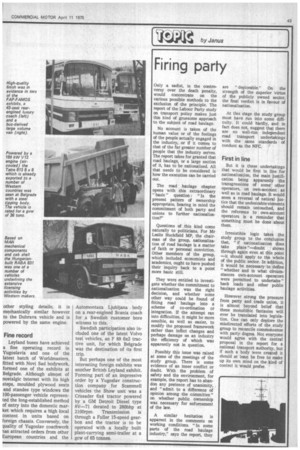Firing party
Page 45

If you've noticed an error in this article please click here to report it so we can fix it.
Only a sadist, in the controversy over the death penalty, would concentrate on the various possible methods to the exclusion of the principle. The report of the Labour Party study on transport policy makes just this kind of gruesome approach to the subject of road haulage.
No account is taken of the human value or of the feelings of the people actually engaged in the industry, or if it comes to that of the far greater number of people that the industry serves. The report takes for granted that road haulage, or a large section of it, has to be nationalised. All that needs to be considered is how the execution can be carried out.
The road haulage chapter opens with this extraordinary " basic" question : "Is the present pattern of ownership appropriate, bearing in mind the commitment of both party and unions to further nationalisation?"
Questions of this kind come naturally to politicians. For Mr Leslie Huckfield MP, the chairman of the group, nationalisation of road haulage is a matter of faith or personal conviction. Other members of the group, which included economists and academics, ought to have pushed their inquiry back to a point more basic still.
They were entitled to investigate whether the commitment to nationalisation was the right decision, and whether some other way could be found of fitting road haulage into a scheme of co-ordination or integration. If the attempt ran into difficulties, it might be more sensible, as well as easier, to modify the proposed framework rather than inflict changes and perhaps damage on an industry the efficiency of which was apparently not in question.
Possibly this issue was raised at some of the meetings of the study group. There is some evidence of an inner conflict or doubt. With the problem of safety and the environment, for example, the report has to abandon any pretence of unanimity, and "admit to a difference of opinion among the committee" on whether public ownership was necessary for enforcement of the law.
A similar hesitation is apparent in the comments on working conditions. "In some parts of the road haulage industry," says the report, they are "deplorable. On the strength of the superior virtue of the publicly owned sector, the final verdict is in favour of nationalisation.
At this stage the study group must have run into some difficulty. It could hardly, and in fact does not, suggest that there are no well-run independent road transport undertakings with the same standards of conduct as the NFC.
First in line
But it is these undertakings that would be first in line for nationalisation, the main justification being apparently the transgressions of some other operators, on awn-account as well as in road haulage. It would seem a reversal of natural justice that the undesirable elements should remain untouched, and the reference to own-account operators is a reminder that something must be done about them.
Irresistible logic takes the study group to the conclusion that, " if nationalisation does take place "—doubt shows through again even at this point —it should apply to the whole of the public sector. In addition, it would be necessary to define "whether and in what circumstances own-account operators were permitted to undertake" back loads and other public haulage activities.
However strong the pressure from party and trade union, it is almost beyond belief that these monolithic fantasies will ever be translated into legislation. One can only deplore the misdirected efforts of the study group to reconcile commonsense with party dogma. Not everyone would agree with the central proposal in the report for a national transport authority, but if such a body were created it should at least be free to make up its own mind on the kind of control it would prefer.




































































































































